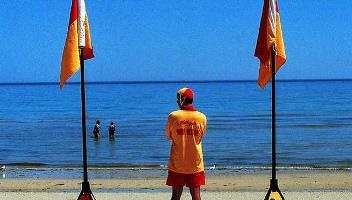The most important flags on the beach are the red and yellow flags. These show the supervised area of the beach and that a lifesaving service is operating.
If there are no red and yellow flags, the beach is unpatrolled and you should not go swimming.

Never swim alone, at night, under the influence of alcohol or directly after a meal. Always check water depth before diving in and never run and dive into the water from the beach.
Brought to you by Lifesaving Victoria, BeachSafe includes the location, facilities, weather, conditions and lifesaving services for all Australian beaches to help you find the right beach. BeachSafe also provides expert advice about flags and signs, waves, rip currents, marine creatures, surf skills and more.
This section includes a series of multilingual videos that give you Surf Life Saving Australia's top five tips for visiting an Australian Beach.
BeachSafe is also available as an App.